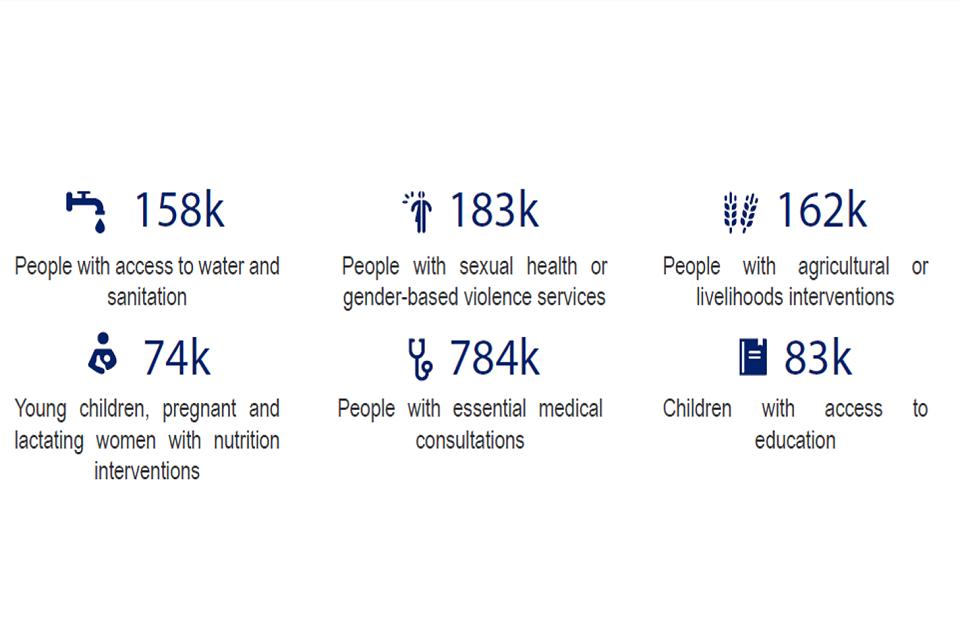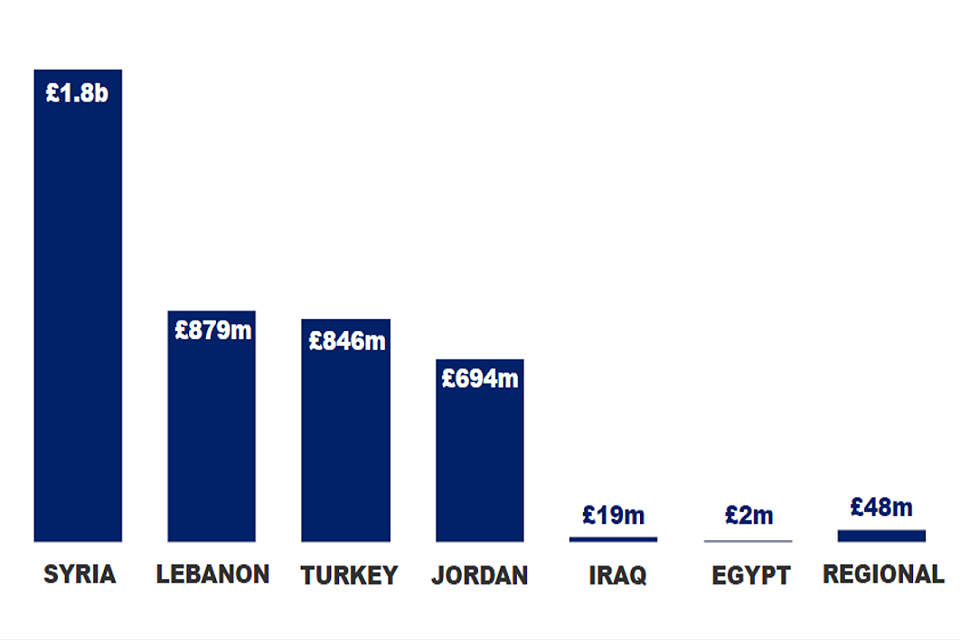UK humanitarian aid and spend in Syria factsheet
Updated 22 October 2024
Humanitarian response
Background: facts of the crisis (as of 2024)
Summary data:
- 16.7 million people in need of humanitarian assistance (total population 23.9 million)
- 2 million Syrians in refugee camps
- 7.2 million Syrians are internally displaced
- 5.5 million Syrian refugees in neighbouring countries
- $USD 9.6 billion funding target for the UN appeal on Syria
What FCDO has done to help in Syria?
The conflict in Syria has entered its fourteenth year with millions of people still in need of humanitarian support. It is estimated that over 600,000 people have been killed in the conflict.
In response to the crisis the UK has provided over £4.3 billion in aid to over 30 implementing partners including United Nations agencies, international non-governmental organisations and the Red Cross. This support has reached millions of Syrians across Syria, Jordan, Lebanon, Turkey, Iraq, and Egypt – helping to meet the urgent needs of those in Syria and of Syrian refugees across the region.
The UK’s humanitarian programme in Syria was refocused in 2022 to support longer term sustainable change through education and early recovery programmes, in addition to continuing to provide life-saving humanitarian aid across Syria.
In the 2023 to 2024 financial year, FCDO programming in Syria has supported:

Data in chart:
- 158,000 people with access to water and sanitation
- 183,000 people with sexual health or gender-based violence services
- 162,000 people with agricultural or livelihoods interventions
- 74,000 young children, pregnant and lactating women with nutrition interventions
- 784,000 people with essential medical aid consultations
- 83,000 children with access to education
Key components of our strategy
Localisation:
- the UK will support local leadership on development, climate, nature and humanitarian action. In 2023, 19% of the budget for Syria was allocated to local NGOs
Early recovery:
- In 2023, over 40% of the UK’s aid budget for Syria was allocated to early recovery, livelihoods, and providing long term opportunities for Syrians.
Since the FCDO response to the crisis began in 2012, our activities in the region have delivered:
Summary data:
- 28.5 million monthly food rations
- 26.1 million medical consultations
- 6.3 million cash grants
Financial overview
What is the FCDO doing across the region to support the crisis?
ODA spent on the Syria crisis by FCDO, by country (February 2012 to March 2024)

Data in chart:
- Syria: £1,809 million
- Lebanon: £879 million
- Turkey: £846 million
- Jordan: £694 million
- Iraq: £19 million
- Egypt: £2 million
- Regional: £48 million
Notes:
- Turkey spend is inclusive of FCDO EU Directorate contributions to FRIT
- regional spend includes technical and operating programming. As of 2023 this was merged with country budgets
- multilateral spend or centrally managed programmes that may indirectly support Syrians are not included
Description:
The chart shows cumulative spend towards a country from February 2012 to March 2024. Syria, the leftmost column, has the highest spend at £1.8 billion (£1,809 million).
Lebanon (£879 million), Turkey (£846 million), and Jordan (£694 million) all have similar levels of spend. The remaining countries, Iraq, Egypt, and Regional have little spend in comparison.
Key humanitarian strategies in or relating to Syria
Syria
- reduce human suffering by meeting the needs of the most vulnerable people
- prevent further economic and societal decline by building resilience at individual and community level
- improve the effectiveness of the overall international response to the crisis
Lebanon
- provide assistance and protection; reduce gender-based violence, save lives, and reduce suffering
- support the Government of Lebanon to ensure education for all children, including Syrian refugees
- support municipalities in at-risk areas to manage tensions through the provision of basic services
Turkey
- support the Government of Turkey to host Syrian refugees. UK support has been channelled through EU’s Facility for Refugees in Turkey (FRIT) since 2016. Interventions include cash transfers enabling refugees to meet basic needs, building and equipping schools, and training for teachers and medical staff
- replace FRIT support with new bilateral programming for 2024
Jordan
- provide life-saving humanitarian cash assistance to support the needs of the most vulnerable refugees
- promote financial inclusion of refugees to foster economic self-reliance and stability
- improve access to gender-based violence prevention services for refugees and host communities
- support economic opportunities for refugees and Jordanians
- build longer term stability by supporting Jordan’s programme of political and economic reform
Final notes
For methodological information, please refer to data sources and methodology. For further information contact statistics@fcdo.gov.uk
